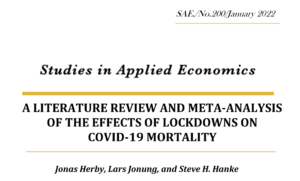Researchers at Johns Hopkins University in Baltimore have concluded that lockdowns in Europe and the United States resulted in only a 0.2% decrease in mortality while inflicting  far greater social and economic costs in the continents.
far greater social and economic costs in the continents.
Authors Jonas Herby, Lars Jonung, and Steve H. Hanke defined lockdown as “any government mandate that directly restricts peoples’ possibilities, such as policies that limit internal movement, close schools and businesses, and ban international travel.”
The report was also critical of “Shelter-In-Place Orders” (SIPOs), those mandating home confinement unless essential travel is necessary, finding they reduced Covid-19 mortality by only 2.9%.
Overall, our meta-analysis fails to confirm that lockdowns have had a large, significant effect on mortality rates. Studies examining the relationship between lockdown strictness (based on the OxCGRT stringency index) find that the average lockdown in Europe and the United States only reduced COVID-19 mortality by 0.2% compared to a COVID-19 policy based solely on recommendations. Shelter-in-place orders (SIPOs) were also ineffective. They only reduced COVID-19 mortality by 2.9%.
Studies looking at specific NPIs (lockdown vs. no lockdown, facemasks, closing non-essential businesses, border closures, school closures, and limiting gatherings) also find no broad-based evidence of noticeable effects on COVID-19 mortality. However, closing non-essential businesses seems to have had some effect (reducing COVID-19 mortality by 10.6%), which is likely to be related to the closure of bars. Also, masks may reduce COVID-19 mortality, but there is only one study that examines universal mask mandates. The effect of border closures, school closures and limiting gatherings on COVID-19 mortality yields precision-weighted estimates of -0.1%, -4.4%, and 1.6%, respectively. Lockdowns (compared to no lockdowns) also do not reduce COVID-19 mortality.
Researchers began with 18,590 studies before screening them to the 24 used in the report, which separated the 24 into three categories covering lockdowns in general, the stringency in which they were mandated, and SIPOs.
The report’s eligibility criteria only included studies that attempted to establish a relationship (or lack thereof) between lockdown policies and COVID-19 mortality or excess mortality. It excluded studies that used cases, hospitalizations, or other measures.
The study concluded while lockdowns had little to no public health effects, “they have imposed enormous economic and social costs where they have been adopted. In consequence, lockdown policies are ill-founded and should be rejected as a pandemic policy instrument.
The Kansas Department of Health and Environment did not respond to The Sentinel’s request for comment on the Johns Hopkins study.



